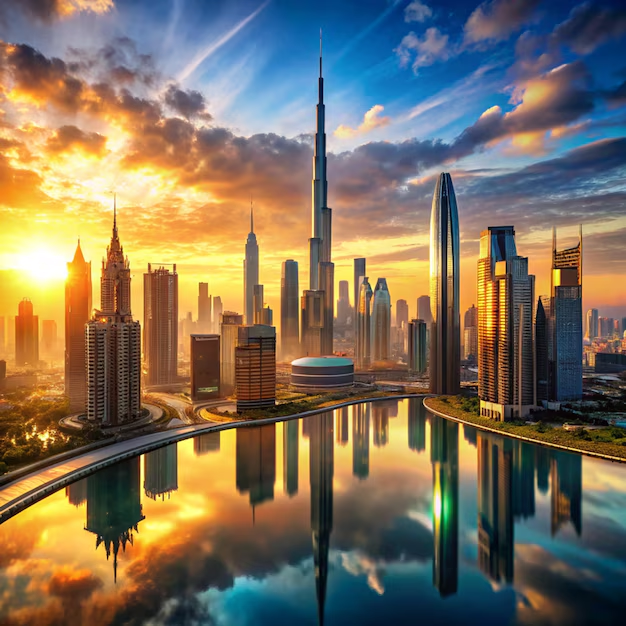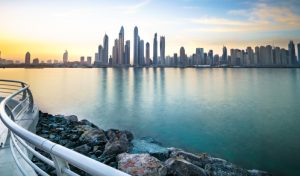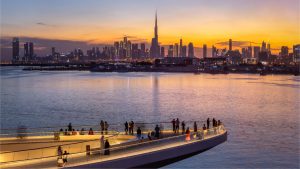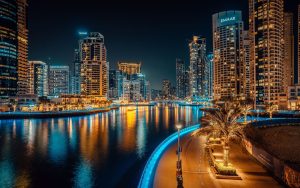
Source: DXBInteract
An Overlook at Dubai Freehold Investment
The real estate market in Dubai presents a unique opportunity for investors.
Understanding the historical growth and current trends, alongside the legal framework for foreign ownership, is essential for making the right investment decisions.
Historical Growth and Current Trends
Dubai has witnessed significant growth in its freehold property market since it opened up to foreign investors in 2001.
The introduction of freehold areas allowed non-citizens to buy and fully own properties, attracting a wave of foreign investment.
As demand increased, many areas saw rapid development, leading to higher prices and rental yields. Popular neighborhoods include:
- Dubai Marina
- Palm Jumeirah
- Downtown Dubai
Current trends show a growing interest in luxury and sustainable developments. These projects appeal to both investors and residents looking for quality living spaces.
Additionally, subsequent events such as Dubai 2040 Urban Master Plan and the Big 5 Dubai Expo continue to draw global attention, suggesting a bright future for freehold investments.
Legal Framework for Foreign Investors
The legal framework surrounding freehold investments in Dubai is designed to be investor-friendly.
Foreign nationals can purchase property in designated freehold areas, ensuring they have full ownership rights. This includes selling, leasing, or inheriting properties without restrictions.
Key regulations for investors include:
- Property Ownership: Foreign owners can hold complete title to their properties.
- Investment Visa: Buyers investing a minimum amount can qualify for a real estate investment residency visa, enhancing their ability to live and work in Dubai.
- Property Registration: All real estate transactions must be registered with the Dubai Land Department for legal protection.
These regulations work together to create a secure environment for foreign investors, encouraging long-term investment in Dubai’s vibrant real estate market.
Real Estate Law Amendments in Dubai Freehold Areas
Recent amendments to the freehold property laws in Dubai have made it easier for foreign investors to own property.
The Dubai Land Department oversees these regulations and enforces rules that promote transparency and security in the market.
Changes include reduced restrictions on ownership duration and simplified procedures for acquiring property. These updates give investors more confidence, knowing that their investments are supported by a stable legal framework.
Additionally, amendments have introduced clear guidelines for property management, dispute resolution, and ownership transfers. This clarity helps protect your interests and fosters a conducive environment for real estate investments.
Growing Trends in Freehold Property Investment
Freehold property investment in Dubai is experiencing significant changes influenced by various factors. Here are some aspects shaping the future of the freehold market in Dubai.
Demographic Shifts and Their Influence
Dubai’s population is diversifying rapidly. As more expatriates settle in the city, the demand for freehold properties is increasing.
Young professionals and families seek quality housing, which directly impacts property types in demand.
Key demographics include:
- Young Professionals: Looking for modern apartments in vibrant areas.
- Families: Prefer spacious villas with amenities for children.
- Retirees: Seeking quieter areas with a community feel.
These groups influence the types of properties being developed, encouraging real estate builders to focus on family-friendly communities and luxury apartments.
This shift can lead to growth in property values and attract more investors.
Economic Factors Driving Investments
Economic conditions significantly impact freehold property investments.
The UAE government promotes a favorable investment climate, which attracts foreign investors. Initiatives such as tax incentives and reduced restrictions make it easier for you to invest in real estate.
Notable economic factors are:
- Tax-Free Environment: No property taxes, making investing more appealing.
- Strong Currency: Stability in the UAE dirham boosts investor confidence.
- Growing Tourism: Increased tourist activity leads to higher rental demand.
As the economy continues to grow, the outlook for freehold properties remains strong.
Risk Analysis and Mitigation
Understanding the risks associated with freehold investment in Dubai is vital for success.
By analyzing market volatility and employing effective diversification strategies, you can position yourself to manage potential downsides.
Market Volatility and Risk Management
Dubai’s real estate market can experience significant fluctuations. Economic changes, policy shifts, and global events can affect property values and rental rates. You should monitor market trends closely to identify potential risks.
Consider conducting regular market assessments to gauge demand and pricing. You should stay informed about local regulations and developments, as changes can impact your investment’s viability.
Additionally, having a financial plan in place can help you respond to market shifts. This might include setting aside funds for unexpected costs or downturns. By preparing proactively, you can minimize losses and seize new opportunities as they arise.
Diversification Strategies for Investors
Diversification helps reduce risk across your investment portfolio. By spreading your investments across different property types, you can protect against downturns in any single area.
Consider investing in a mix of residential, commercial, and mixed-use properties. This approach allows you to tap into various market segments and income sources. Each category reacts differently to economic changes, providing stability.
Additionally, think about geographic diversification. Investing in different neighborhoods or regions can shield your portfolio from local market volatility.
Ultimately, a well-diversified portfolio can provide a safety net. This strategy allows you to manage risks more effectively while maximizing your potential returns in Dubai’s dynamic real estate market.
Future Outlook for Freehold Investments in Dubai
The future of freehold investments in Dubai looks promising, driven by new zoning laws and a growing demand for properties.
Investors can expect increased opportunities in emerging areas, as well as stable market conditions supported by favorable tax policies.
Predictions for Market Growth and Stability
Market analysts foresee steady growth in Dubai’s real estate sector. Key factors include:
- Strong demand: With a rising population and ongoing development projects, housing needs continue to increase.
- Zero property taxes: This cost-saving feature enhances net returns for investors, making freehold properties more attractive.
- Regulatory support: New zoning laws could lead to more streamlined processes for property development and ownership.
You may find that these aspects create a reliable foundation for your investments moving forward. The combination of demand and favorable policies positions Dubai as a leading destination for real estate investment.
Emerging Areas and Property Types
You should pay attention to upcoming neighborhoods gaining popularity. Areas like Dubai Creek Harbour and Dubai Hills Estate show great potential. They offer:
- Affordable housing options: These neighborhoods cater to a diverse group of buyers, from first-time homeowners to investors.
- Modern developments: New properties often include innovative designs and amenities.
Focusing on these emerging areas can provide unique opportunities for your portfolio. Understanding property types that appeal to renters will also be critical as you assess your investment strategy in the evolving market.
Future Projections and Market Forecasts
The future of investment in Dubai’s freehold areas looks promising. Several key factors will influence this market.
- Economic Growth: The UAE economy is projected to grow by 5.0% in 2025. This growth is fueled by ongoing population increase and strong non-oil sectors.
- Real Estate Value: By the end of 2024, the real estate market is expected to reach a value of 141.9B AED.
- Rental Yields: You can expect rental yields to remain solid. Projections show 5% annual growth for rental income.
- Price Trends: Residential property prices had a remarkable 19% increase year-on-year in 2023. Since 2020, prices have risen by 30%, indicating strong demand.
- Market Segments: The hospitality, residential, and retail sectors are forecasted to perform well in 2024. Increased tourism and business activities will likely boost these areas.
- Investment Opportunities: Areas with upcoming infrastructure and development projects will present good opportunities. Look for investments in these evolving neighborhoods.
These projections highlight a supportive environment for your investments in Dubai’s freehold areas.
About QUBE Development:
QUBE Development, a subsidiary of DHG Investments, is a leading real estate developer in Dubai of high-quality residential and commercial properties. Standing on a 30-year legacy of experience and excellence, QUBE is dedicated to transforming living spaces in the UAE by integrating sustainable architecture, captivating design, and unparalleled amenities.
As a community-focused property developer in Dubai, QUBE Development aims to set the benchmark for real estate development by creating the foundation for generational wealth for customers. The company prioritizes durability and quality in every project. Expanding its portfolio throughout the UAE, QUBE Development responds swiftly to the evolving market demands, maintaining a commitment to providing the highest quality builds through collaborations with world-renowned architects and in partnership with a dedicated contractor to ensure meticulous attention to design and construction.
Real Estate In Dubai UAE | Real Estate Company In Dubai | Top Property Developers In Dubai | Buy Dubai Property | Real Estate Developer In Dubai | Off Plan Dubai | Off Plan Property Dubai




